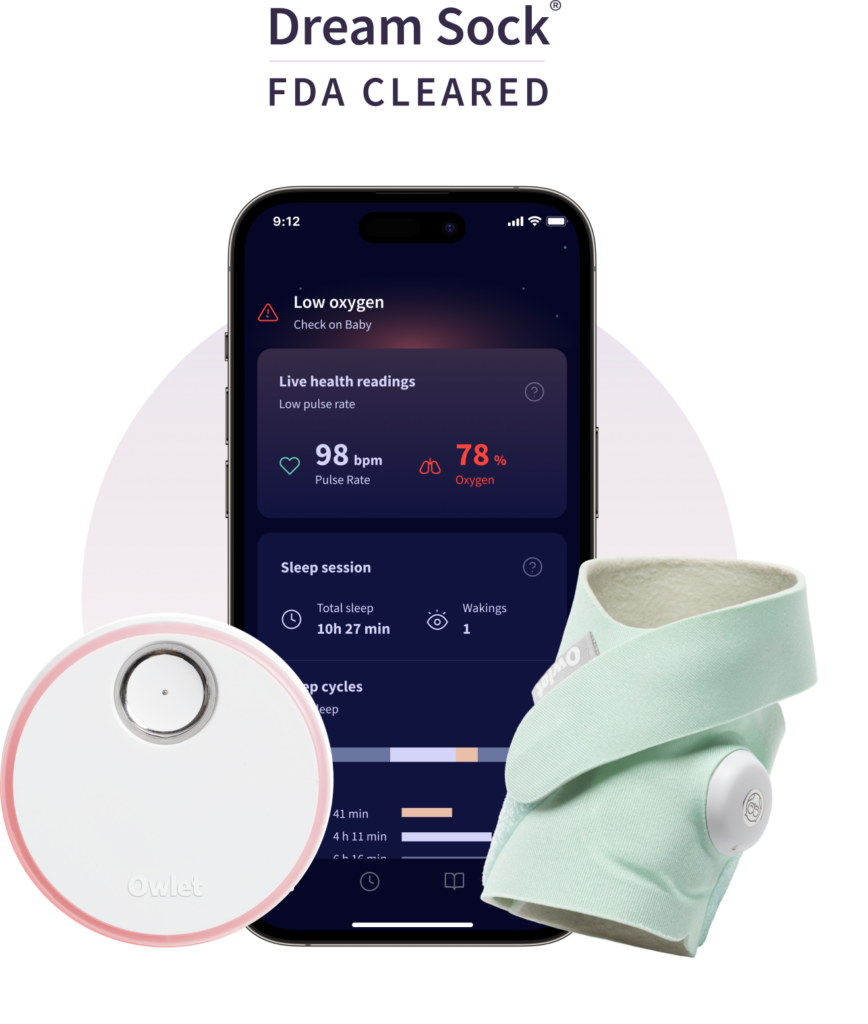 Some really good news for Owlet. The Dream Sock finally got to the mountain top and received de novo FDA clearance for pulse oximetry. To date, it is the only over-the-counter medical pulse oximetry device for the baby market. This adds to the device’s Baby’s Live Health Readings, including pulse rate and oxygen saturation level. The platform also provides Health Notifications, which send alerts to a smartphone with lights and alarm sounds if baby’s readings fall outside of preset ranges. Existing and new Dream Sock buyers will be upgraded to the new features by end of 2023. The Dream Sock is for use with infants 1-18 months and 6 to 30 pounds. Pricing observed for the current Dream Sock is in the $300 range. Owlet release
Some really good news for Owlet. The Dream Sock finally got to the mountain top and received de novo FDA clearance for pulse oximetry. To date, it is the only over-the-counter medical pulse oximetry device for the baby market. This adds to the device’s Baby’s Live Health Readings, including pulse rate and oxygen saturation level. The platform also provides Health Notifications, which send alerts to a smartphone with lights and alarm sounds if baby’s readings fall outside of preset ranges. Existing and new Dream Sock buyers will be upgraded to the new features by end of 2023. The Dream Sock is for use with infants 1-18 months and 6 to 30 pounds. Pricing observed for the current Dream Sock is in the $300 range. Owlet release
This follows FDA clearance for the prescription BabySat in June [TTA 21 June]. That is scheduled to be introduced later this year in the US only. The non-prescription Dream Duo, which combines the Dream Sock with a baby cam, will continue to be sold.
Financially, things have improved a lot since last year. The stock as of 11 July was restored to NYSE listing, but it required a reverse split and an 18 month compliance plan, Currently, it’s trading at about $4.80 which is NYSE compliant, up from well below $1 in June. Also in July, they hired a new president and chief revenue officer, Jonathan Harris, from recently acquired air purification system Molekule. In August, they reported a Q2 adjusted EBITDA loss of $4.3 million, narrowed substantially from prior year Q2’s $16.7 million. This was achieved on lower revenue of $13.1 million versus last year’s $18.3 million. Q1 revenue was $10.7 million. Q3 will be reported on 13 November. Release Having followed them since the ‘telehealth for the bassinet set’ days of 2012-2013, their continued independence, and their focus on baby health, this Editor continues to wish them bonne chance.
Mass General Brigham’s hospital-to-home and home care programs get a Best Buy boost. Mass General plans to integrate Best Buy’s delivery capabilities for their Healthcare at Home program in several areas. For Home Hospital acute care, Best Buy will supply the Current Health remote patient monitoring program to build out a technology-enabled clinical delivery model that connects patients to nurses, paramedics, advanced practitioners, and physicians. For Home Care, Best Buy will supply Lively Mobile Plus personal emergency response system (PERS) and leverage out capabilities such as Geek Squad to supply Mass General Brigham (MGB) patients with delivery of home-based care and logistics management for the care team. MGB plans to introduce Best Buy as part of Home Hospital in five Boston-area acute care hospitals. The program is for patients with heart disease, chronic obstructive pulmonary disease (COPD) and infections. While their Home Care operation is stated by MGB to be the largest certified provider in New England, the Home Hospital program can presently cover only 33 patients at a time. MGB’s goal is to shift 10% of inpatient care to patients’ homes over the next five years, so expanding capacity and capabilities are critical. FierceHealthcare, Mobihealthnews, MGB release
Get your One Medical now, just $99 per year or $9 a month! It’s an offer hard to refuse for Amazon Prime members. It’s half off the annual membership of $199, with additional members up to five for only $6 a month or $66 annually. What Prime members get is 24/7 virtual care access without further charge through their app that includes video chats with licensed providers plus their “Treat Me Now” service, fast care for common issues like cold and flu, skin issues, allergies, and urinary tract infections. It does not include any One Medical in-office services, if available in the member’s area. The 200 million+ Prime members were briefly offered in February a $144 membership but apparently this new incentive is not only at a deeper discount, but also longer term or permanent.
Time to make that $3.9 billion acquisition pay off. This push is clearly to build up One Medical membership, which stood at only 836,000 members at end of 2022, and build up cash flow. Amazon is not reporting on the success of the earlier discount offer. A question this Editor has–if 1 million Prime members signed up–that’s only a 0.5% rate–does One Medical have the telehealth capacity to serve these patients, especially at peak usage such as cold and flu season?
Prime members are also able to access Amazon Care, which is virtual only, cash-only by medical event asynchronous telehealth services. If a Prime member goes in person to a One Medical practice, they do take insurance. FierceHealthcare, Healthcare Dive, Amazon Prime offer page










Most Recent Comments